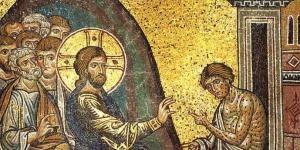A leper came to Jesus and kneeling down begged him and said,
“If you wish, you can make me clean.”
Moved with pity, he stretched out his hand,
touched him, and said to him,
“I do will it. Be made clean.”
The leprosy left him immediately, and he was made clean.
Then, warning him sternly, he dismissed him at once.He said to him, “See that you tell no one anything,
but go, show yourself to the priest
and offer for your cleansing what Moses prescribed;
that will be proof for them.”The man went away and began to publicize the whole matter.
He spread the report abroad
so that it was impossible for Jesus to enter a town openly.
He remained outside in deserted places,
and people kept coming to him from everywhere. Mark 1:40-45
So my handy dandy Harper Collins NRSV says that Jesus is moved with pity at seeing this poor man walking around with some kind of skin disease. Leprosy was a word that covered a whole host of skin conditions, from measles, to psoriasis, to teenage hormone enraged acne. These skin aberrations were thought to be an outward symbol of an inward brokenness. If he looked this bad on the outside, just imagine the mess that must be going on on the inside. And if we get near that messy exterior, that interior will surely spread to us, as well. And although many ancient manuscripts use the term σπλαγχνίζομαι, splanchnizomai, “to be moved with pity or compassion,” to describe Jesus’ emotion upon seeing this man; there is one ancient text that reads “anger,” and, the editors of Harper Collins argue, this may be the original. Either way, Jesus is full of emotion, he is physically affected, possibly even a little bit pissed off by this man’s situation. And so, he responds to this leper with his whole self — he reaches out and touches the untouchable. This act would surely make a man ritually unclean, no longer welcome in the temple, cast out of the community until the proper rites are enacted to return him to cleanliness status. In a sense, as Jesus reaches his hand out to touch this leper, he is saying, #metoo. Jesus touches this man and becomes unclean, he joins this man not with a kind of passive mutuality, but with an angry solidarity.
This is the healing, not that the leper suddenly has no more skin problems, but that Jesus crosses the human-inflicted and false boundaries between acceptable and unacceptable, clean and unclean, pure and impure. Maybe Jesus injects the man with some of his purity and suddenly they can both freely walk the town without jeers or repulsion. But if this Jesus is anything like the Jesus who finds himself crucified on a dark Friday afternoon, I’m willing to bet that it’s the other way around. Jesus takes on the malformity, and in so doing, he transforms it. Redeems it. Resurrects it.
Or no. Maybe he doesn’t do that at all.
Maybe Jesus takes on this socially constructed and defined “malformity” and transforms us, not it at all. Maybe he redeems us, resurrects us, helps us see rightly again. Maybe he shows us that he can be found in all those places where shame and doubt and fear and anxiety like to hide. And this is what makes Jesus so nuts. We want all these things about ourselves to be fixed because somebody, somewhere told us so. We bought the lie that we are not good enough just as we are.
No. Jesus doesn’t cure the leper’s malady. He cures the leper.
And then he tells the leper to go cure everybody else.
“Go.” he says, “Defy what you’ve been told about who you are. Go and claim your rightful place in this messy humanity. I’m right there with you. Go. Proclaim it publicly. Proclaim yourself clean, that you’ve always been clean. You belong. You’ve always belonged. Go and claim your non-binary status. Come out and show your transgendered-ness, or your partnership, or your depression, or your limp, or your tumor. Share your broken heart. Reveal your scars. Go into the town and tell them that they do not get to define who you are anymore. Because now, you and I,” Jesus says, “now, we share an identity. And all those ways that folks have forced their shame upon you are wiped clean. Go. Tell them you’ve been healed.”
*****
Jenn Frayer is a cradle Catholic apostate who is now an ordained pastor in the PC (USA). When she’s not taking care of her two boys or making coffee drinks as an overeducated barista, she writes and thinks in Pittsburgh, PA. You can find her writing at jennfrayer.wordpress.com and at https://medium.com/@












